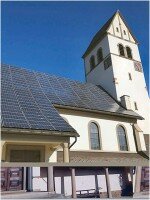Nuclear energy, no thanks – we’ll do it ourselves
Posted in Repowering communities on 12/07/2011 04:12 pm byThree months after the Fukashima nuclear reactor caught fire, Germany decided to phase out nuclear power. The decision stunned Europe’s energy policy community. Nuclear presently provides a quarter of Germany’s electricity – how would it plug the gap?
However, this wasn’t the first time a nuclear accident had caused such soul searching within Germany. Twenty-five years ago after the Chernobyl nuclear accident, people in Schönau im Schwarzwald decided to take the non-nuclear option. A local pressure group Parents for a Nuclear Free Future created a small enterprise to reduce energy use and instead provide its people clean, non-nuclear electricity.
They organised a referendum to compulsory purchase the local network from the local electricity utility KWR. How could a small hamlet of 2,500 people take over responsibility for running a power company? The referendum was divisive, pitting family against family, but it was eventually passed. However, KWR demanded twice the price for the local network as offered by the village. The village launched a nationwide appeal for DM5 million offering investors shares in their co-operative to pay for the local network.

Schönau church: photo courtesy of Will Dawson
Using the proceeds from the share issue, EWS Schönau redeveloped some disused hydro-power facilities and built several small combined heat and power plants. After Germany liberalised its electricity market EWS Schönau began providing green electricity to customers throughout Germany. Its customer numbers have grown from 1,000 local households to over 120,000.
However, EWS Schönau’s own generation is not sufficient to supply this larger consumer base. Most of the new customers have been supplied with renewable electricity bought from the wholesale market – Norwegian hydro and a small amount from gas fired combined heat and power (CHP). The company has rejected renewables produced by Germany’s major power companies since the parent companies use nuclear or coal elsewhere in their operations.
The fixed price feed-in tariff, and especially the generous levels of support for solar PV, has allowed the village to increase greatly the amount of locally generated solar electricity. The utility also buys self-generated power from its customers that have installed solar PV on their own homes and pays them a small premium “the sun cents” above the feed-in tariff. A photovoltaic church figured above has its entire south facing roof covered in solar panels – this makes a great image – and it has generated enough electricity to power 100 home-years since the installation.
The energy rebels have created a vibrant small energy company that has successfully exploited local energy hydro and CHP resources. They also created one of the earlier co-operatively owned energy companies, where voting rights were widely shared amongst a wide number of local people. This has created local jobs and bolstered local pride. The decision to take on the local electricity utility, which, in recent times, communities in California have also done, has arguably been a distraction from the main job of reducing demand and securing permission and funds for developing local alternate sources of energy.
However, rebels need something to rebel against and their struggle has given them nationwide notoriety and brought people’s unhappiness with nuclear power to wider attention. And maybe Germany’s recent decision to forsake nuclear wouldn’t have been made without the energy rebels’ earlier crusade.
 Prashant Vaze is co-Author Repowering Communities Earthscan. He participated in a recent delegation to Germany arranged by the Co-Operative Group Ltd.
Prashant Vaze is co-Author Repowering Communities Earthscan. He participated in a recent delegation to Germany arranged by the Co-Operative Group Ltd.


